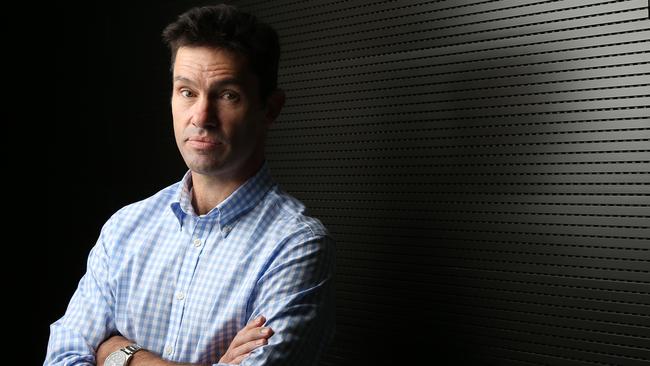12 operations in six years: Gina Savage fights back to find a cure for melanoma
Three years ago, Gina Savage was told she had six months to live because of a melanoma. She’s still alive and raising awareness to find a cure for the cancer that kills an Aussie every six hours.
QLD News
Don't miss out on the headlines from QLD News. Followed categories will be added to My News.
A young woman, battling stage 4 melanoma, is hoping to raise awareness for early detection through The Six Hour Project and its inaugural black-tie event.
Gina Savage was first diagnosed with stage 1 melanoma aged 20, but in the past six years, the cancer has “progressed” to various places, including her liver, lungs, abdomen, pelvis, bones and ovaries.
Ms Savage said she recently had two portions of her bowel removed, along with four abdominal tumours.
“I’ve had 12 surgeries in six years, but that was probably my biggest,” she said.
“Prior to that, I’ve had my ovaries removed.
“I also recently found out my fourth attempt at immunotherapy treatment was unsuccessful, but I’m fortunate enough in the sense that had I just been diagnosed even years prior, it’s likely I wouldn’t be here today.”

Ms Savage said three years ago she was told the “surreal” news she had just six months to live.
“I’ve been lucky enough to have access to a number of immunotherapy drugs, but none of them have been my miracle drug,” she said.
“I’m still on the hunt for the one that will cure me.
“It sounds so odd, but that’s the whole aim of the game, to just sort of hang in there until the next thing becomes available, whether it be a trial or readily available treatment.
“It comes down to the power and importance of research.”
Ms Savage said she hoped to raise awareness for melanoma detection, but also find a cure for the 50 per cent of melanoma patients who were not responding to their current treatment.
New research has found almost a third of melanomas found during skin checks may not be harmful.
QIMR Berghofer Medical Research Institute cancer scientist David Whiteman, who led the study, said the results suggested up to 29 per cent of the melanomas detected during skin checks might never have come to light if that person had not been screened.

“Recent research suggests that cancers evolve on a spectrum,” Mr Whiteman said.
“Many grow very quickly and are very aggressive. These are the ones that quickly come to light because they cause symptoms, and sometimes death.
“When we find these cancers through screening, we cannot tell at the point of detection whether it is a fast-growing or a slow-growing cancer.
“They can look just the same under the microscope.”
Primary prevention through sun-safe behaviours was extremely important and early detection vital, he said.
Ms Savage said one person died every six hours from melanoma in Australia – an “incredibly scary” statistic.
“Just that one person who messages saying ‘I had my skin checked because of you’ – I think that gives me a bit of purpose and that empowers me to keep sharing my story,” she said.
“When I first started doing this years ago, it was actually one person every five hours.
“We are hoping to make that statistic redundant altogether.”
The Six Hour Project and major sponsor Mercedes-Benz Brisbane will hold their inaugural A Night for Melanoma event on August 20.




